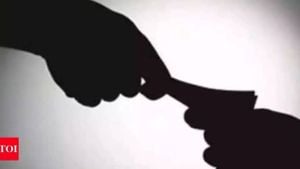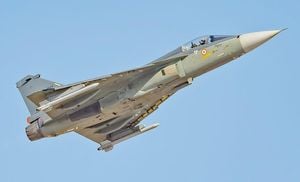Marc Fogel, an American teacher who had spent more than three years imprisoned in Russia, was welcomed back to the United States on Tuesday night after the Trump administration successfully negotiated his release. Fogel landed at Joint Base Andrews, Maryland, where he received a jubilant reception, including hugs from officials and family members eagerly awaiting his return.
Fogel's emotional homecoming follows his arrest at a Moscow airport back in August 2021, when he was found carrying 17 grams of cannabis, which he used for medical purposes to treat chronic back pain. He was sentenced to 14 years of hard labor after being convicted of drug smuggling, even though he held documentation for his prescription.
His family, who described the years of his imprisonment as the darkest period of their lives, expressed overwhelming relief at his return. "We are beyond grateful, relieved, and overwhelmed... Today, we begin to heal," they said, acknowledging the efforts of President Trump and others who campaigned for his release.
Trump's administration, particularly his special envoy for the Middle East, Steve Witkoff, played pivotal roles in negotiating the arrangement with Russian officials. National Security Adviser Michael Waltz noted the release was part of broader efforts to improve relations between the United States and Russia during the tumultuous backdrop of the Ukraine conflict. "This is a sign we are moving in the right direction to end the brutal and terrible war in Ukraine," Waltz stated.
Upon his arrival, Fogel expressed extreme joy and gratitude. "I feel like the luckiest man on Earth right now," he stated, draped with the American flag. The moment captured by the media showcased his emotional return.
Trump emphasized the diplomatic significance of Fogel's release. "We were treated very nicely by Russia, actually. I hope that's the beginning of a relationship where we can end the war and millions of people can stop being killed," he remarked, hinting at the importance of fostering stronger ties with Russian President Vladimir Putin.
Despite the celebration, the circumstances surrounding Fogel's arrest and subsequent imprisonment have drawn international scrutiny and provided discussions around justice and the treatment of American citizens abroad. Fogel had lived and worked as part of the teaching staff at the Anglo-American School, primarily serving expatriate families, before the geopolitical tensions affected his status and legal standing.
Fogel's case was particularly concerning for many, as it echoed the plight of other Americans imprisoned under unsympathetic circumstances during the war. His release highlights the complicated nature of American diplomacy, especially amid strained relations with Russia. There are still several Americans, including dual nationals, whose cases remain unresolved. Senator Marco Rubio contextualized Fogel's release as indicative of potential cooperative engagements between Russia and the U.S., albeit cautioning about the long road still ahead.
The release of Marc Fogel is seen as part of simultaneously developing international dynamics, bringing attention to the specific case of American citizens caught within foreign legal frameworks. It raises questions about the future of U.S. policy surrounding detentions abroad and the strategic importance of diplomacy as it relates to personal freedom.
Fogel's return is welcomed news not only for his family, who eagerly awaited his homecoming, but also for many Americans watching the broader diplomatic dialogues evolve. Elected officials, including his Pennsylvania senators, praised his release and advocated for continued efforts to secure the freedom of others similarly detained.
Looking forward, the hope surrounding Fogel’s return yields cautious optimism about future negotiations and outcomes concerning other Americans still held abroad. The success of such efforts may well depend on the continued engagement of U.S. officials and the response from foreign governance structures.
Marc Fogel's freedom on February 11th, 2025, acts as both closure and the beginning of broader conversations about the nature of justice, diplomacy, and the rights of individuals caught between political strife.



